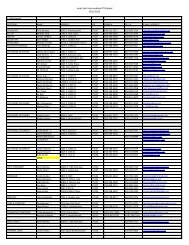Hamlet/Raskolnikov Similarities
Hamlet/Raskolnikov Similarities
Hamlet/Raskolnikov Similarities
You also want an ePaper? Increase the reach of your titles
YUMPU automatically turns print PDFs into web optimized ePapers that Google loves.
•The protagonist is above ordinary people, and he/shemust be brought from happiness to misery (suffering =pathos).•The choice made by the protagonist is significant and isdictated by his/her own error, frailty, or mistakenjudgment. (tragic flaw or hamartia [ha-marr-tea-a])•The error, frailty, or mistake is not necessarily a flaw incharacter but rather an extreme response to extraordinarycircumstances.•Other Greek terms: catharsis – purging through emotionalresponse, especially pity and fear
•The two great eras of tragedy were Ancient Greece andElizabethan England. The difference between the two eras oftragic greatness lies in the Greek emphasis of fate andjustice versus the Christian possibility of salvation andgrace.•Tragedy consists of pairs of opposites: pity and terror;justice and love; paradoxes, antitheses.•Tragedy asks the ontological (speculating the nature ofbeing – human nature) question: “Is ‘being’ good or evil?”•Tragedy is composed of three parts:1. fall - terrible deed2. suffering - stage marked by stasis, murkiness, notknowing3.reconciliation and self-knowledge
Revenge Tragedy•Dates back to the work of Seneca, a 1st century RomanMotifs•Revenge of a father for a son or vice versa•The hesitation of the hero•The use of either real or pretended insanity•Intrigue•An able, scheming villain•Philosophical soliloquies•Sensational horrors (murders and threats of violence onstage; exhibition of dead bodies; supernatural appearances)
Elsinore wasprobablyHelsingor11
Fortinbras--aNorwegianprince--actsas a foil for<strong>Hamlet</strong>.1212
Kronborg Castle13
moreKronborgCastle...14<strong>Hamlet</strong> attends theuniversity atWittenberg,Germany.14
<strong>Hamlet</strong>’s Tragic Flaw! (Hamartia)What the Critics Say….Goethe (1749-1832) The great German poet argued that<strong>Hamlet</strong> is not brave enough. He lacks the “right stuff.”The dramatic situation is like an acorn (the problem)planted in a cracked vase (<strong>Hamlet</strong>) As the problemgrows, <strong>Hamlet</strong> becomes less sound.AC Bradley(1851-1935): Famous Shakespeareanscholar said that <strong>Hamlet</strong> suffers from “melancholia” oris merely mentally deranged.Ernest Jones(1879-1958): The Freudian interpretation:Oedipus Complex. He still has a childish sexual fixationon momma Gertrude, thus his attitude toward Claudiusis ambivalent; he is grateful to Claudius for removinghis “rival” for his mother’s affections (King <strong>Hamlet</strong>) butmust also resent him as his new father figure.15
Samuel Taylor Coleridge: The great British Romantic poetbelieves <strong>Hamlet</strong>’s delay is caused by “the effect of asuperfluous activity of thought.” He thinks too much because heis too elevated for this world…has too fine a character.Cindy Lou Camp: AP paean who trembles at the feet of MountOlympus believes that <strong>Hamlet</strong> is a character created byShakespeare who isn’t real. BUT she also thinks that as aperpetual student (<strong>Hamlet</strong> isn’t a young buck) might over-thinkthings a bit and would rather study the ramifications of murderbefore jumping into a life of crime. Plus—a ghost? Not reliable.OR: Maybe <strong>Hamlet</strong> doesn’t have a flaw. He is merely waiting forthe ghost to be proven honest or not. A sort 21 st centuryexistentialist hero He is faced with a problem whose answermay lie beyond the limits of human reason or in fact may nothave an answer. His uncertainty makes him “unstable.”16
Elements of a Revenge Tragedyby Dame Helen Gardner (British scholar andprofessor at Oxford 1908-1986)*In a typical revenge play the protagonist must killthe slayer of his relative or firend in the mostterrible way possible.a. The hero faces a predicament not of his ownmaking.b. The villain provides the means for the vengeancec. The avenger conceives a plot and puts it intoaction.d. Usually the hero descends to the moral level ofthe man being punished ( a mild irony) with aterrible revenge scheme.e. The denouement of <strong>Hamlet</strong> shows a “profound”irony: Claudius plans <strong>Hamlet</strong>’s death, but both heand his queen die.17
Some bits and pieces of fascinating stuff thatmight show up on your final…1. Unnatural: the murder of a brother by abrother2. Denmark is disturbed-dead king, invadingprince, new king.3. Incestuous marriage4. ghost5. Appearances vs. Reality6. 28% of play is prose.7. short metric lines, rhyming couplets, sharedlines, prose, feminine (unaccented) endings,long lines, broken lines (caesuras!)8. Alexandrine lines: 12 syllables. Usuallybroken by caesura for emphasis.17











